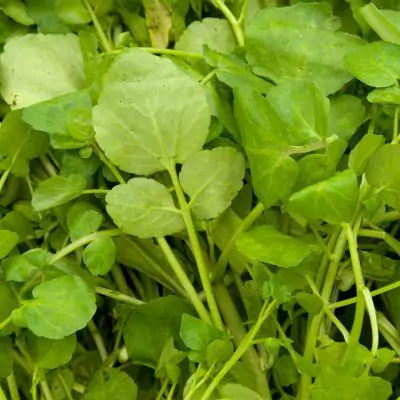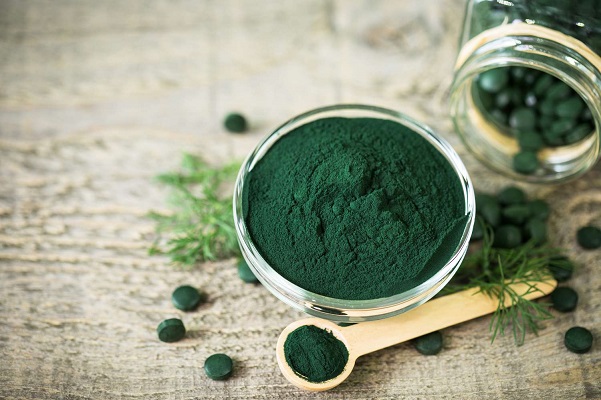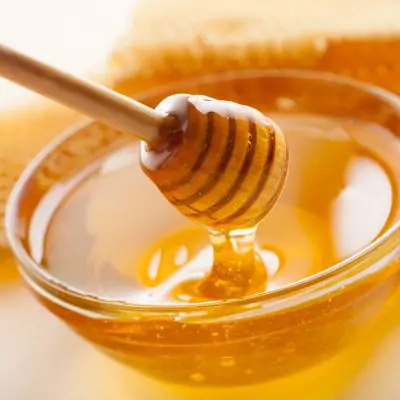On This Page
Overview
A dark green leaf with a mildly peppery flavor and a bitter tang, watercress is one of the first greens that people have eaten. It is a member of the exotic cabbage, broccoli, and kale family. Due to the herb’s high nutritious content, it is becoming one of the superfoods.
The taste of the watercress leaf is peppery. To produce an Italian flavor combination, it is typically used as a garnish over salads, in sandwiches, or diluted with vinegar. Watercress can be eaten uncooked. Additionally, the leaf, stem, and flower are all edible parts of the plant. Even though its roots might not taste unpleasant, you shouldn’t eat them.
Synonyms of Watercress
- Nasturtium officinale
- Jalkumbhi
- Chansaur
Nutritional Facts of Watercress
A half-cup serving of watercress contains:
| Calories: | 2 |
| Protein: | Less than 1 gram |
| Fat: | Less than 1 gram |
| Carbohydrates: | 1 gram |
| Fiber: | Less than 1 gram |
| Sugar: | Less than 1 gram |
Phytochemical Constituents of Watercress
- Reducing sugar
- Carbohydrates
- Flavonoids
- Saponin
- Glycosides
- Steroids and phenolic compounds
Therapeutic Uses of Watercress
- Aids stop and slow skin aging
Sunlight degrades the skin’s Elastin and Collagen. Watercress has an ingredient called isothiocyanate (ITC), which, along with vitamin C, can aid STOP and prevent the breakdown of collagen and elastin and increase collagen formation, resulting in younger, healthier, and more elastic skin. As a result, cellulite and wrinkles will be diminished.
- Stimulates healthy pregnancy
Watercress has a lot of folates, making it a great food for pregnant women. According to studies, eating foods like watercress that are high in folate can reduce the incidence of neural tube insufficiency.
- Enhances Functioning of Thyroid Gland
The health of the thyroid has been positively impacted by watercress. It functions by lowering the production of thyroid hormones and is best consumed uncooked. To fully enjoy watercress’s nutritional benefits, it is best to softly steam it.
- Healthy gut
Watercress is a fantastic source of fiber to support our microorganisms, but it also boasts one of the highest concentrations of antioxidants.
- Ease from Pediatric Asthma
Children with asthma should consume foods high in vitamin C daily. Such young children may find relief from asthma by eating watercress.
- Useful Cure Against Common Cold
Vitamin C-rich foods have been linked to the prevention and treatment of the common cold. Watercress is renowned for clearing up any congestion that has built up inside the body and shielding against conditions like asthma.
Home Remedies Watercress
- Healthy bones
You can get all the vitamin K you need for the day by eating 1 cup of raw watercress. This fat-soluble vitamin aids in bone development in addition to blood coagulation.
- Promotes the flow of bile
Watercress’s bitter flavor helps encourage the liver’s bile flow. Bile aids in the emulsification and digestion of fats as well as the digestion and absorption of essential fat-soluble vitamins including Vitamin A and Vitamin E. A healthy bile flow is also required for effective detoxification since the liver uses bile to eliminate toxins and waste products that are fat-soluble.
- Piles
Watercress, carrot, spinach, and turnip leaf juice together are efficient in breaking up the clumped blood fibrin. If taken daily, a liter of this will heal the illness in 2 to 6 months. However, the diet must completely exclude all forms of white bread, sugar, and meat.

Have A Health Issue?
Consult Online
- Dr. Sahil Gupta (B.A.M.S., M.H.A.)
Ayurvedic Allergy Specialist
CEO & Founder of IAFA®
Ayurvedic Aspects of Watercress
Watercress is recommended as part of a daily diet by Ayurvedic vaidyas (experts) because they are healthy for your skin, and hair, and for clearing amavisha (toxic wastes) from the body. Watercress helps cleanse your shrotas (the body’s subtle channels), which make up roughly 60% of the human body, and refill your internal water reserves.
Daily Dose: 85 grams of raw watercress is a daily recommendation
Side Effects of Watercress
- Hazardous for pregnant women
Pregnancy is probably not a good time to eat watercress. It might trigger a miscarriage and the onset of menstruation. So it’s advisable to refrain from using it.
- Kidney stones
If you have kidney illness, avoid using watercress. It might be harmful and interact negatively with the drugs. Additionally, the oxalates in the watercress encourage the development of kidney stones.
Conclusion
Watercress is a potent vegetable that is very low in calories and rich in important vitamins, minerals, and micronutrients. Additionally, it has several antioxidants that can fend off numerous cancers as well as many chronic illnesses. You may use it to replace lettuce or spinach in your meals and it is a fantastic addition. It might not be the most well-liked vegetable, but it is one of the healthiest. Despite the many advantages of watercress, there are a few considerations to make before including it in your meals. If you face any side effects from watercress, you can Consult Dr. Gupta at IAFA to get a natural and herbal cure for your illness.
References
- https://www.webmd.com/diet/health-benefits-watercress
- Amiri H 2012 Volatile constituents and antioxidant activity of flowers, stems and leaves of Nasturtium officinale R. Br Natural product Research 2 109-115
- https://iopscience.iop.org/article/10.1088/1755-1315/761/1/012042









